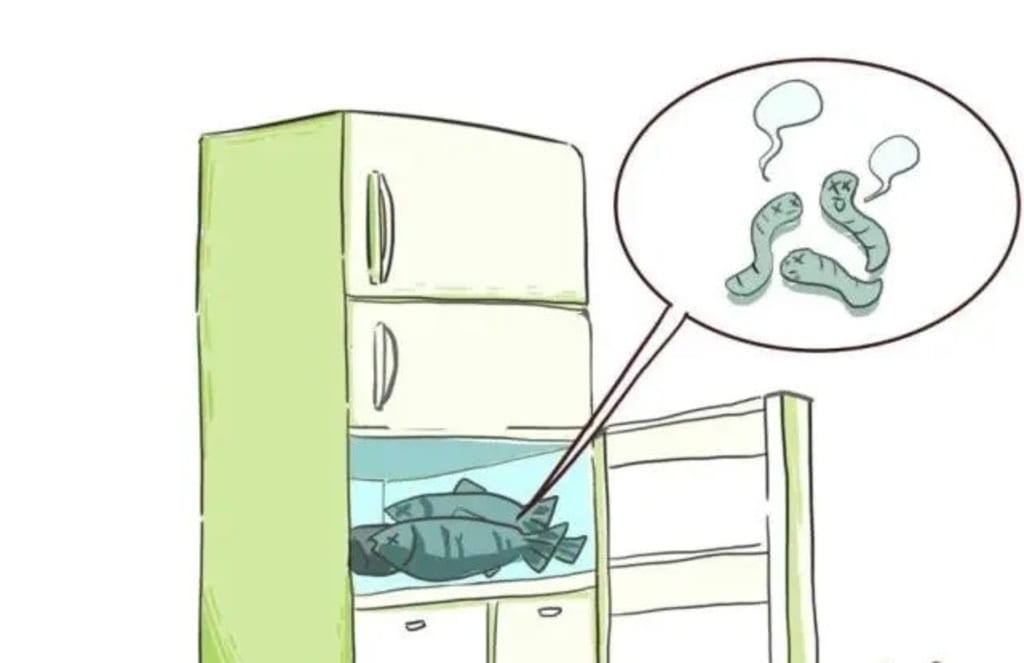Salmon sparking epidemic fears again?
What risks do we take for the deliciousness of raw food?

Some pals like salmon, drunken crab, and drunken shrimp are delicious, and others like rare steak, and raw beef dishes.
This raw seafood, and meat food there are some health risks.
1 parasitic worm
Parasites are the most concerned about the health of raw animal food.
For example, salmon, salmon mishmash, and salmon sushi, which are commonly eaten in Japanese restaurants, are all eaten in a raw form.
If you are eating real salmon, that means Atlantic salmon.
This fish lives in seawater, which has fewer parasites, usually hetero cyst nematodes and split-head tapeworms.
These parasites do not tolerate low temperatures and are frozen to death after deep freezing.
Therefore, ocean-caught salmon can be safely eaten raw after regulated deep freezing.
If you are not eating real salmon, but domestic rainbow trout, it is a different story.
Rainbow trout and salmon are so similar that even some professionals can't tell the difference, let alone us ordinary diners.
However, despite the similarity in appearance, rainbow trout, which comes from freshwater, is not suitable for raw consumption.
There are more types and numbers of parasites in freshwaters, such as broad-sectioned split-head tapeworms, lung flukes, and jaw,s, and mouth nematodes, to name a few.
Not all of these parasites are afraid of low temperatures, and some must be cooked at high temperatures to kill them.
So when you eat rainbow trout or other freshwater fish and shrimp raw, you run a significant risk of contracting these parasites.
That previous Beijing Japanese restaurant, although temporarily relieved of the crisis of the new crown virus, will again be caught in the whirlpool of deceiving consumers and the risk of parasitic infection.
In addition to the risk of parasites in raw seafood and freshwater fish, some raw meat dishes also have such risks.
Food-loving friends may have tried the famous French beef dish beef tartar, with fresh raw beef chopped into pieces and mixed which is a world-renowned supreme delicious, as also Korean raw beef, Japanese raw beef, Japanese raw beef, and other dishes.
There is also raw beef in Korea and beef mishmash in Japan.
Some small partners like to have a rare steak with blood and water.
These eating methods can be infected with parasitic tapeworms and interstices in beef.
These parasites are afraid of temperature, and temperature cooking completely kills these parasites.
Not only beef, but other livestock meat is also generally not recommended to be eaten raw, not to mention wild animals.
2 Bacteria
Another health risk of eating raw animal food is a bacterial infection.
There are many places where it is customary to eat eggs raw, believing that the nutrition of raw eggs is better.
It is possible to eat eggs raw, but not all eggs can be eaten raw.
Most ordinary eggs are contaminated with Salmonella, a virus that can cause diarrhea and abdominal pain and can be life-threatening.
In China, there are no strict standards for eggs, and the detection of salmonella generally does not meet the standards for raw eggs.
Some of you may ask: I've seen Japanese dramas where people often eat raw eggs, but I haven't heard that they often get infected with germs!
This is because of the difference in food culture. Japan has a habit of eating raw eggs, and their eggs meet the raw food standard, so you can eat them without worry.
In addition to eating raw eggs, there is also a risk of bacterial infection when you love to eat drunken crab, drunken shrimp, and other aquatic products.
There is a kind of Vibrato parasympathetic in aquatic products, and consumption of food containing this bacteria can easily cause diarrhea, vomiting, and other poisoning symptoms.
This bacterium is not heated or acid resistant and can be killed in just 5-10 minutes at 56 degrees Celsius.
It is also very sensitive to acid and can die in 1-3 minutes in ordinary vinegar.
Therefore, when consuming aquatic products, whether it is freshwater or seawater, they should be fully heated and cooked, sanded thoroughly, and not raw as much as possible.
Or add some vinegar to the cooking, which can also effectively kill the bacteria.
Although many vegetables and fruits are recommended to be eaten raw because it can ensure getting more vitamins.
But raw meat foods are not comparable to fruits and vegetables, which starts from the fact that we get different nutrients from them.
Vegetables and fruits obtain mainly vitamins and dietary fiber.
Some varieties of vitamins are not heat resistant and will be lost more or less after heating and cooking while eating them raw will allow you to get more of them.
Animal food, on the other hand, we mainly get its protein, which will be denatured after heating, but it does not prevent us from absorbing it.
On the contrary, eating raw animal food will make the protein absorption and digestion rate less than 50%, while cooked food can reach about 90%.
At the same time, eating raw animal foods will also prevent the absorption and utilization of vitamin B.
Vitamin Be is also called thiamine, and fish and shellfish meat contains a thiamine enzyme, which is also called the "anti-thiamine factor" and causes the breakdown of thiamine.
Thiamine can be extinguished in an environment of 60 degrees and lose its effect, therefore, eating cooked fish, shrimp, crab, and shellfish is not a problem, but in long-term raw food, the body is prone to vitamin Be deficiency.

1 Adequate heating
When eating animal food must be fully heated to avoid parasites, and bacterial infection, while nutrient absorption is also more efficient.
2 Do not eat burnt meat food
Although animal food should be heated sufficiently, it is not recommended to overheat.
Already burnt meat and fish, it is generally recommended to eat less or not, especially fish.
The proteins in fish are not so heat-resistant and can produce hetero cyclic amines, which are carcinogens when heated above 200 degrees.
The fat in fish is even more afraid of heat.
At 120 degrees Celsius, the rate of oxidation and polymerization is already greatly accelerated.
At 300 degrees, more poly cyclic aromatic hydrocarbons, such as the infamous Benz(a) the Pyrenees, can be produced.
3 Fish and seafood should be consumed in moderation each time
Fish and seafood are prone to bioconcentration, which means that many pollutants in the environment are difficult to decompose, such as lead, arsenic, mercury, PCB, etc.
Then the more organisms at the top of the food chain, the more serious the pollution.
Therefore, when consuming fish and seafood, it is important to control the amount, about 75-100 grams two to three times a week is recommended.
Although raw animal food is not recommended for dogs, it does not mean that raw food is not allowed (or the dog will be assassinated).
Occasionally a taste is no problem at all, only be sure to go to a regular restaurant, so that the quality of raw food will be more secure.
1 What are the risks of eating raw animal food?
Raw animal food has the risk of infection parasites and bacteria.
2 animal food raw food will be more nutritious?
Raw animal food can hinder the absorption and utilization of protein and vitamin Be.
3 How to eat animal food in a healthy way
(1) Heat well
(2) Do not eat burnt meat products
(3) Fish and seafood should be consumed in moderation each time
About the Creator
Tomei Ianu
We soon believe what we desire.






Comments
There are no comments for this story
Be the first to respond and start the conversation.